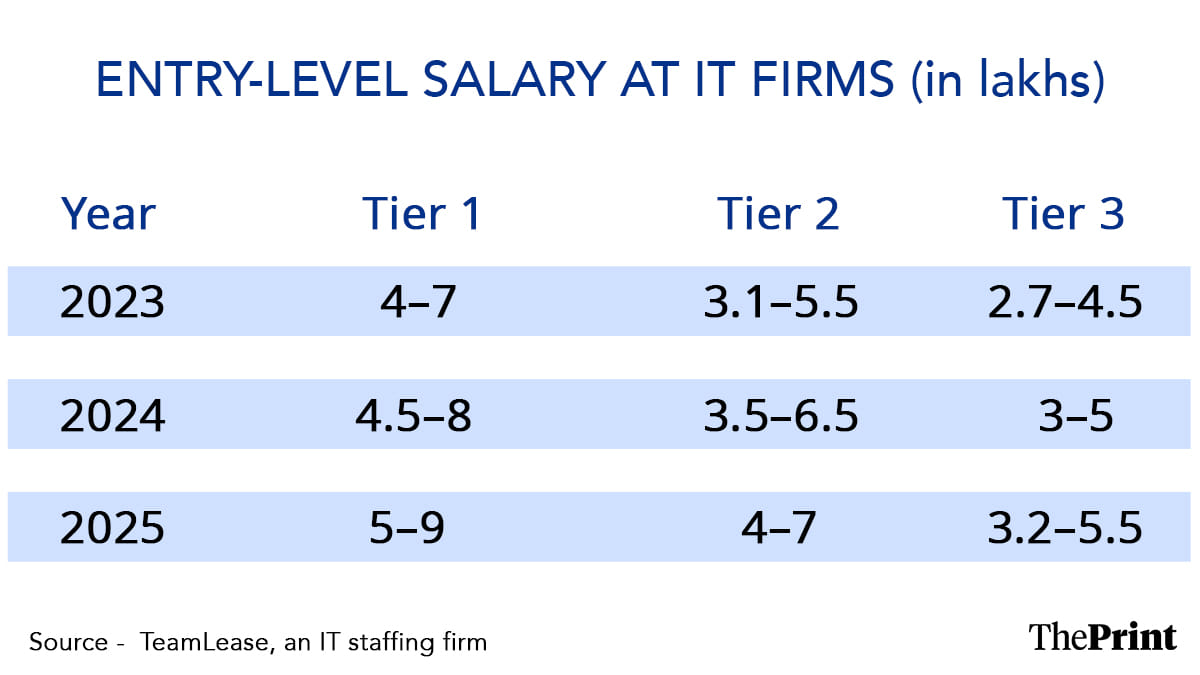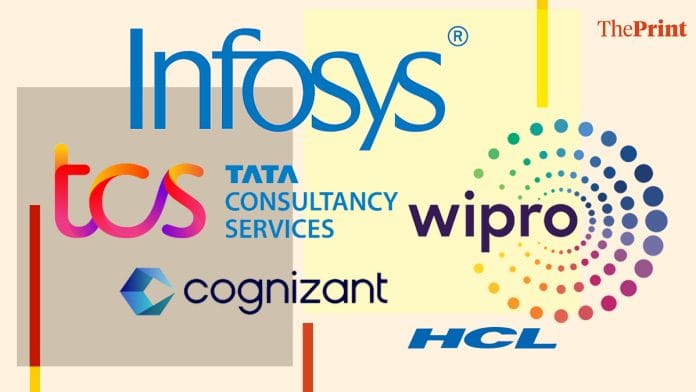Gurugram: A fresher at Tata Consultancy Services’ Ahmedabad office lives in a cramped, double–sharing arrangement with three other colleagues, whom he met at the company’s training programme. A monthly salary of Rs 24,000 isn’t enough to buy him the luxury of a single room – even in Gandhinagar, where the office is located.
“I’m lucky that I had some savings to buy a bike, otherwise I would have to walk to work,” he said, explaining that public transport, including ride–hailing services, are unreliable in the area. “And even after what I save through sharing a room, dating is not an option.”
Despite being the engine of India’s middle-class boom and a driver of upward mobility, India’s $280-billion IT services sector has barely moved the needle on entry-level pay in more than a decade. Fresh graduates at TCS, Infosys, and Wipro still take home roughly the same starting salaries as their peers did in the late 2000s, even as the cost of living has soared.
Stagnant pay has left young engineers disillusioned, a sharp contrast to the starry-eyed optimism with which these firms were regarded decades ago. But it’s not just the pay — the entire business model of IT services firms has come into question. In July, TCS announced the elimination of over 12,000 jobs — 2 per cent of its workforce — to focus on AI-driven strategies.
“There is a supply-demand imbalance,” said Abhijit Bhaduri, former Chief Learning Officer of Wipro and a talent management advisor. “Organisations increase wages of groups where they see value. Either a person’s value needs to go up, or they will be replaced with somebody else who is willing to do the work.”
Bhaduri went on to add that the business models of these companies have stagnated. The marketplace is shifting from very generic, inter-changeable talent to skills-based hiring. “If you have the skills which are in demand — like AI or machine learning — people will pay a premium for it,” he said.
As big-ticket contracts from Western clients show signs of slowing, smaller tier-2 and tier-3 IT services firms are stepping in to capture shorter, lower-value projects. Over the past decade, 15 mid-tier firms crossed $1 billion in revenue. These companies now offer starting salaries comparable to their larger, more established peers, according to Neeti Sharma, CEO of TeamLease Digital, an IT and tech staffing firm.
“I think that the charm of only going to Infosys or Wipro, that is slowing down,” said Sharma, adding that she has seen smaller IT firms rapidly scale up their headcounts over the last few years. “And I think that’s a good thing. Get the skills, learn on the job and then get to other positions.”
A golden ticket
At TCS’ sprawling GG7 campus in Gurgaon, employees shuttle in and out of two imposing glass buildings built on a 21-acre plot. The tech giant’s campus tour highlights a cricket pitch, a cafeteria serving hot Indian meals, and smiling employees engaged in group fitness activities. For many of India’s fresh graduates, the country’s largest IT services firms offer a springboard to a successful career — a sentiment dating back to the 90s and 00s when outsourcing was in full swing.
After India’s push for liberalisation in 1991, the flood gates opened for the sector. US-based clients signed multi-million dollar contracts with Indian firms, fueling unprecedented growth. Infosys built large campuses with basketball courts and swimming pools, TCS expanded nationwide, and Wipro hired thousands of graduates every year.

For the first time, an engineering degree from a state college in Kanpur or Coimbatore could guarantee not just a steady job, but a middle-class lifestyle. Young employees bought their first Maruti Swifts and motorbikes, signed up for housing loans and credit cards, and flooded newly built malls. In cities like Bangalore, the IT salary powered the rise of gated communities, private schools, and weekend getaways.
“Look at the boom in air travel that happened at that time,” said Bhaduri, adding that flights were no longer seen as a luxury. “When something moves from luxury to affordability, that’s the sign of a growing middle class.”
On-site projects abroad offered another perk: international travel. Many employees took their first trips to the US or Europe, with a portion settling there permanently. The IT job became a golden ticket — not just for upward mobility in India, but also for migration abroad.

“Think of a family in a tier three city who would have taken an education loan of about five to ten lakhs and got their child in an engineering institute,” said Sharma, adding that the hope was for their child to move to Bangalore or Hyderabad for work. “In a two-year time frame, their children would move to the US or Europe for work, and their life would be set.”
But as the decades rolled on, cracks began to appear in the IT dream. Entry-level wages stayed roughly the same, on-site work at client locations abroad started drying up and technological advances like AI rendered many services obsolete. The IT services sector is no longer seen as a quick route out of the bottom of the pyramid.
“The dream is now fading. There’s very little on-site work and that whole plan of going abroad to settle down, that’s going away,” said Sharma.
Also read: Delhi University is crumbling. And it has united NSUI, ABVP, AISA
A mismatch
As the demand for entry–level jobs in the IT sector soared in the mid-2000s, a degree in computer science or engineering became the default for India’s graduates. Parents pushed their children to pursue technical degrees, in the hope that they would land a job at ‘WITCH’ — a colloquial term used to denote India’s legacy IT firms: Wipro, Infosys, TCS, Cognizant/Capgemini, and HCL.
“Some people told my father that Infosys was a great place, and several people had gone abroad from there,” said an ex-Infosys employee, whose family was influenced by the aspirational value that the company provided. “Working in a European country had always been my dream. Unfortunately, the reality turned out to be quite different from what I expected.”
There’s a common belief that service-based companies overwork you for their clients. Most people want to work at product-based companies
– an ex-Infosys employee
The employee, from Dehradun, joined Infosys in 2018 in Mysore, Karnataka. He initially made Rs 13,000 per month as an intern but later earned Rs 26,000 per month as a fresher after six months of on-the-job training.
“I ended up leaving the company because of the low salary and disagreements with the management,” he said, adding that it took him a year to find his next job, which almost doubled his annual compensation from Rs 3.3 lakh to Rs 6 lakh.
In addition to low salaries, the outsourcing work done by these companies also began to lose their appeal. The role of a fresher ranges from fixing bugs (errors in the code) and testing client applications to responding to client issues and preparing project reports. Often working long hours and under strict hierarchies, freshers are stuck doing repetitive tasks with little to no innovation.
In today’s rapidly changing environment — rife with new technologies — the job role can often feel stale to new graduates, who feel they are losing out on opportunities. Today’s graduates are hungry for more impactful work, where they can see their lines of code translated into product-level impact. They didn’t just want to de-bug software for US-based companies, but work at India’s new-age startups like Zomato, Paytm, and Urban Company.
“There’s a common belief that service-based companies overwork you for their clients. Most people want to work at product-based companies,” said the ex-Infosys employee, who pointed to the example of a friend working for a US-based client at Infosys. “He works on holidays in India because it isn’t a holiday in the US. And he works on Christmas and 4th of July because it’s not a holiday in India.”
But the low entry-level salary and job role haven’t stopped fresh graduates from applying for jobs at ‘WITCH’. The reality that hits them upon graduating is that these IT firms are the largest employers in an already poor job market. A report by TeamLease stated that only 10 per cent of India’s 15 lakh engineering graduates would find a job in 2024.
This demand and supply mismatch has largely kept wages for entry-level roles unchanged over the last decade, according to Sharma. And the skill mismatch between what graduates offer and what firms look for didn’t help either.
“In 2014, if you look at STEM graduates, the salaries were anywhere between Rs 2-2.5 lakh. That’s gone up to Rs 3-3.5 lakh today, not even enough to cover inflation over the last decade,” said Sharma
She added that there were so many graduates willing to take the job that there was no incentive to increase salaries.
According to her, hiring during the Covid-19 pandemic skyrocketed. In FY 2022-23, 6,00,000 freshers were hired by the IT services industry. But this figure plummeted by 75 per cent after “rationalisation set in”. In the most recent hiring cycle, 1,50,000 graduates were hired by these IT firms, said Sharma.
“While the demand has tapered down, the supply continues to bulge,” she added, also pointing to companies investing in upskilling graduates before client deployment. “If they have to make those investments, they are not going to increase entry-level salaries.”
Bhaduri highlighted that some of these trainings can take up to a year, just to get graduates up to speed on key skills required at the entry level. This ever-increasing gap between what the industry demands and what academia provides has also contributed to a fall in the number of annual hires.
Typically, when someone emerges from an education institute, the assumption is that they are marketable. But over a span of time, today’s marketable skills become commodity skills
– Abhijit Bhaduri, former Chief Learning Officer of Wipro and a talent management advisor
But fresh graduates complain that the trainings are misaligned with their own aspirations. According to the ex-Infosys employee, people in his class intake were trained in languages like JAVA or .NET but couldn’t choose the technology or domain they wanted to learn, forcing them into roles that weren’t necessarily suited to their strengths.
Sharma clarified that in specific skill sets — AI, machine learning, cyber security — companies are willing to pay a premium. But for the majority of graduates who have the standard skill sets, wages would remain unchanged.
“From an employer’s point of view, you have an inherited wage rate — what you have been paying in the past,” said Amit Basole, a professor of economics at Azim Premji University, who isn’t surprised by the wage stagnation. “Any employer would not raise it if they were getting the kind of worker they want.”
Also read: DDA and Delhi University combo brought a biodiversity park revolution. Other cities envy
‘Aura loss’
Landing a job in Mumbai, Delhi-NCR or Bengaluru is the holy grail for fresh graduates, many of whom have spent their entire lives in tier-2 and -3 cities. But the entry-level salaries often translate to frugal lifestyles, even at satellite offices in Ahmedabad or Mysore where cost of living is lower.
“Initially, since it was my first salary, I wasn’t frustrated,” said the ex-Infosys employee, who worked at the firm’s Mysore office. “However, after six months, reality started to kick in. I had responsibilities at home and couldn’t save much at the end of the month.”
For him, the real challenge was traveling back to his hometown of Dehradun. Trains from Mysore would take up to three days, and the Rs-13,000 flights would exhaust six months of his savings. “If an emergency occurred, I wouldn’t have anything to help my parents. During my 1.5 years there, I couldn’t send a penny back home.”
Freshers working at ‘WITCH’ say that the firms have suffered an ‘aura loss’ — a GenZ term used to denote a dimming of that special glow that made them stand out. Graduates are now taking jobs at these firms with the strategic plan of shifting within a few years, to a much higher pay and work of their choice.
“Only 10 per cent of my batch got placed,” said one Hyderabad-based Cognizant employee, who graduated from an engineering college in Meerut. “My aim was to first grab any offer and then upgrade.”
He is already upskilling, practicing coding problems and algorithms on LeetCode, an online platform that helps people prepare for interviews at tech companies. His 3 LPA package just doesn’t cut it in a city like Hyderabad, said the Bihar-born employee whose father works at a corrugated boxes company back in Meerut.
Abhijit Bhaduri has come up with a ‘pyramid of skills’ to illustrate how the landscape is shifting: commodity skills at the base of the pyramid, marketable skills in the middle, and niche skills at the top.
“Typically, when someone emerges from an education institute, the assumption is that they are marketable. But over a span of time, today’s marketable skills become commodity skills,” he said, adding that now even AI is moving from niche to marketable skills, highlighting a rapidly shifting landscape.
IT firms are recognising the precarious position they find themselves in, on the verge of losing their crown to much leaner, adaptable competitors. In June, TCS introduced a new 35-day bench policy — the maximum time an employee can spend in a year without any project assigned — about a month before the tech giant announced 12,000 layoffs.
“Previously, TCS’ USP was that you could sit there, clear government exams without doing any work, still get that salary and leave the firm,” said the TCS Ahmedabad employee, adding that the company now has the shortest bench period amongst India’s top IT firms. “In Hyderabad, an entire building was used to house benched employees.”
(Edited by Aamaan Alam Khan)






